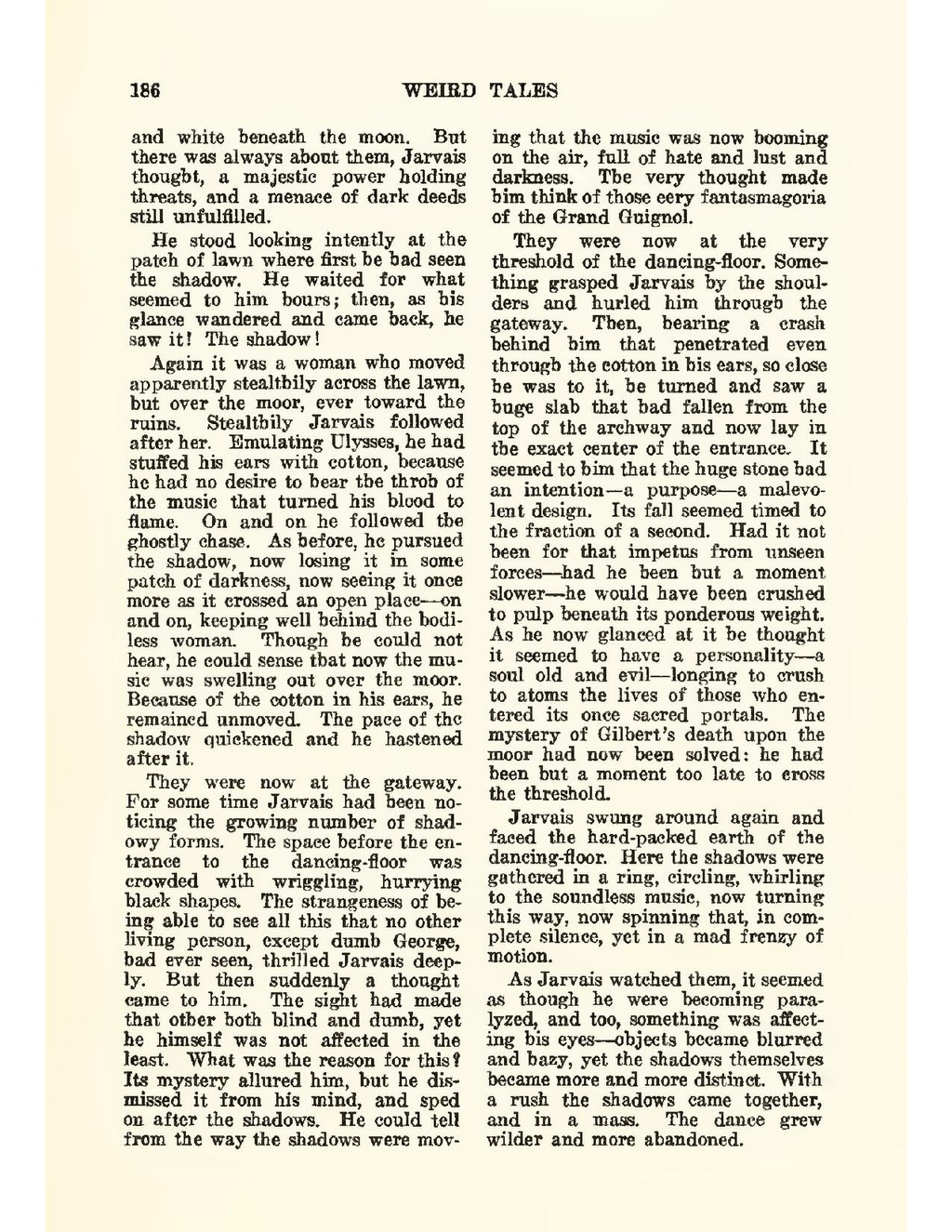and white beneath the moon. But there was always about them, Jarvais thought, a majestic power holding threats, and a menace of dark deeds still unfulfilled.
He stood looking intently at the patch of lawn where first he had seen the shadow. He waited for what seemed to him hours; then, as his glance wandered and came back, he saw it! The shadow!
Again it was a woman who moved apparently stealthily across the lawn, but over the moor, ever toward the ruins. Stealthily Jarvais followed after her. Emulating Ulysses, he had stuffed his ears with cotton, because he had no desire to hear the throb of the music that turned his blood to flame. On and on he followed the ghostly chase. As before, he pursued the shadow, now losing it in some patch of darkness, now seeing it once more as it crossed an open place—on and on, keeping well behind the bodiless woman. Though he could not hear, he could sense that now the music was swelling out over the moor. Because of the cotton in his ears, he remained unmoved. The pace of the shadow quickened and he hastened after it.
They were now at the gateway. For some time Jarvais had been noticing the growing number of shadowy forms. The space before the entrance to the dancing-floor was crowded with wriggling, hurrying black shapes. The strangeness of being able to see all this that no other living person, except dumb George, had ever seen, thrilled Jarvais deeply. But then suddenly a thought came to him. The sight had made that other both blind and dumb, yet he himself was not affected in the least. What was the reason for this? Its mystery allured him, but he dismissed it from his mind, and sped on after the shadows. He could tell from the way the shadows were moving that the music was now booming on the air, full of hate and lust and darkness. The very thought made him think of those eery fantasmagoria of the Grand Guignol.
They were now at the very threshold of the dancing-floor. Something grasped Jarvais by the shoulders and hurled him through the gateway. Then, hearing a crash behind him that penetrated even through the cotton in his ears, so close he was to it, he turned and saw a huge slab that had fallen from the top of the archway and now lay in the exact center of the entrance. It seemed to him that the huge stone had an intention—a purpose—a malevolent design. Its fall seemed timed to the fraction of a second. Had it not been for that impetus from unseen forces—had he been but a moment slower—he would have been crushed to pulp beneath its ponderous weight. As he now glanced at it he thought it seemed to have a personality—-a soul old and evil—longing to crush to atoms the lives of those who entered its once sacred portals. The mystery of Gilbert’s death upon the moor had now been solved: he had been but a moment too late to cross the threshold.
Jarvais swung around again and faced the hard-packed earth of the dancing-floor. Here the shadows were gathered in a ring, circling, whirling to the soundless music, now turning this way, now spinning that, in complete silence, yet in a mad frenzy of motion.
As Jarvais watched them, it seemed as though he were becoming paralyzed, and too, something was affecting his eyes—objects became blurred and hazy, yet the shadows themselves became more and more distinct. With a rush the shadows came together, and in a mass. The dance grew wilder and more abandoned.
